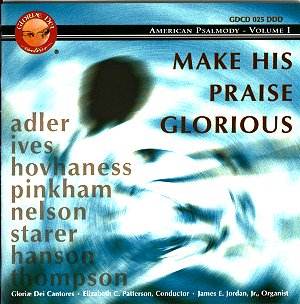When
I saw this disk performed by a chorus and musicians resident at
the Community of Jesus religious commune on Cape Cod (that sound
you hear is the County Assessor weeping at the thought of all
that expensive real estate off the tax rolls), distributed by
them to be sold in church bookstores, and consisting exclusively
of Psalm settings, I was, to say the least, not looking forward
to hearing it. I am for the most part a Buddhist and generic Jahvistic
religious music usually bores me at best. However, after one look
at the list of composers and ten minutes into the disk I was cheering.
The Psalms after all are Hebrew poetry and part of our common
human heritage of great literature. Even sung in English thereís
not a whole lot for even an agnostic to find objectionable in
the texts, which donít actually come across that clearly most
of the time anyway. But obviously they do serve to inspire the
singers, who are excellent. No amateur Sunday church choir here!
With
all this use of Latin, and the "Brothers" and the "Sisters,"
and being so close to Boston, this Community of Jesus must be
mostly Catholic but they specifically state on their website that
they are not doctrinaire and invite to their community all those
who seek God (however one may define Him/Her/It/Them).
Samuel
Adlerís textbook on orchestration lies open on my desk whenever
Iím reading scores. As a composer heís OK; this short fanfare
is appropriately bright, with the expected augmented intervals
and the just slightly off the beat rhythms, and the musicians
all do a fine job. (I want to SEE Sister Rosemary play that trumpet!)
An
English friend once said to me, ĎI guess you have to be really
American to like Charles Ives.í The truth is 99% of Americans
canít stand Charles Ives, who is much more appreciated by British
musical scholars. My favourite Charles Ives story relates how
he was sitting in the balcony of a hall listening to a performance
of one of his works. A youth sitting next to him was complaining
loudly and booing the music. Ives turned to him and said, "Young
man, you just sit there quietly and take it like a man!"
But this work is one of those rare works of his that is easily
accessible, expressing mystery instead of madness. This time we
have Sister Mary on chimes and Sister Elena on drums.
Alan
Hovhaness, one of my all time favourite composers has produced
one of his finest works, here recorded for the first time. Brother
Benedict makes a fine cantor, and again we have Sister Rosemary
on trumpet. This work begins with an amazing, wonderful, chord
for organ, even stranger than the one that begins the Ives piece.
The chorus and baritone intone Psalms 54 and 55 which are anything
but joyful. Then, we get to hear a joyful noise. Even though Hovhaness
was long associated with the Pacific Northwest, he was born and
grew up in Massachusetts, so he is a hometown kid and these singers
give his to music a special reverent intensity.
There
was no surprise in finding that the Howard Hanson and Randall
Thompson (author of the famous a capella Alleluia) works
were especially beautiful, but while the name Daniel Pinkham is
not unfamiliar, work of this quality associated with it is. The
Robert Starer works were harmonically very adventuresome, perhaps
not quite 12 tone but close to it, yet with none of the starkness
or violence of Schoenberg. All the soloists performed their difficult
parts with perfect ease and commitment and excellent tone.
Paul
Shoemaker


